Key takeaways:
- Hospital ministry emphasizes the importance of compassionate presence and active listening during vulnerable moments in individuals’ lives.
- Faith-based workshops foster community, personal growth, and empowerment through shared experiences, helping participants reconnect with their spiritual beliefs.
- Engaging workshop content and participant-driven discussions enhance involvement, leading to meaningful conversations and insights.
- Faith significantly influences healing, providing strength and resilience, especially when supported by a community united in prayer and shared beliefs.
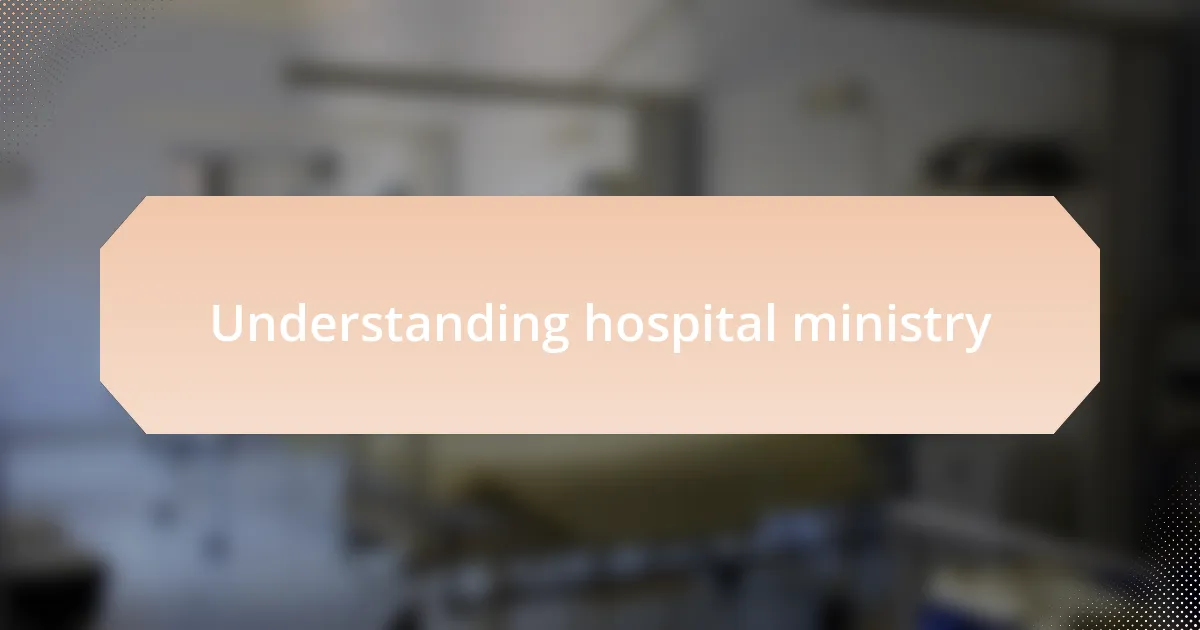
Understanding hospital ministry
Hospital ministry is a unique and powerful expression of faith that reaches individuals during some of the most vulnerable moments of their lives. I vividly remember the first time I walked into a hospital room, the atmosphere heavy with uncertainty. It struck me then—how much comfort a kind word or a prayer can provide in those sterile, intimidating surroundings.
In my experience, hospital ministry is not just about offering spiritual support; it’s also about truly listening. There was a patient I met who had just received a devastating diagnosis. As I sat with her, I realized that sometimes, people need someone to voice their fears and concerns rather than simply offering platitudes. How often do we underestimate the power of presence? That connection often leads to deeper conversations about faith and hope, relevant to their immediate situation.
Navigating the complexities of illness and healing, hospital ministry offers an opportunity to explore faith in a new light. I once facilitated a workshop focused on prayer and healing, and many participants shared their stories of doubt and resilience. It struck me how faith can act as a lifeline, a source of strength that helps individuals make sense of their experiences. Isn’t it remarkable how, in our darkest moments, we can discover profound insights about hope and community?
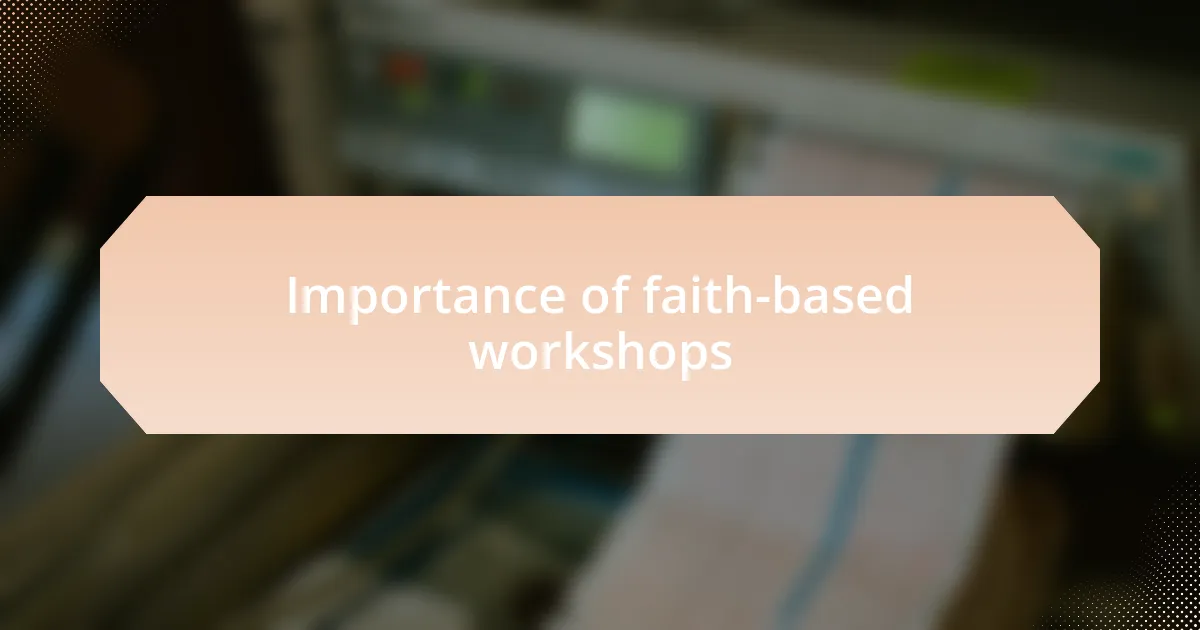
Importance of faith-based workshops
Faith-based workshops serve as a vital bridge for many individuals seeking solace and guidance during difficult times. I remember leading a workshop where participants shared their personal struggles and triumphs. It was touching to witness how opening up about their faith journey helped create an environment of trust and understanding. These workshops not only fostered community but also illuminated paths for healing that many hadn’t previously considered.
One significant aspect of these workshops is their ability to facilitate personal growth through shared experiences. I recall a participant expressing feelings of isolation due to their illness. By sharing their story, they were met with an outpouring of support and empathy from others who had faced similar challenges. This sense of belonging is what makes faith-based workshops essential; they remind us that we are not alone on our journeys.
Engaging in faith-based discussions can inspire attendees to reconnect with their spiritual beliefs in transformative ways. I once hosted a session where the theme was “Finding Hope in Despair.” Participants left feeling uplifted, equipped with new perspectives to tackle their challenges. It’s truly astonishing how exploring our faith collectively can empower and elevate our experiences during trying times. Have you experienced this kind of uplift in your own life? It certainly reinforces the idea that faith can be a powerful source of resilience.
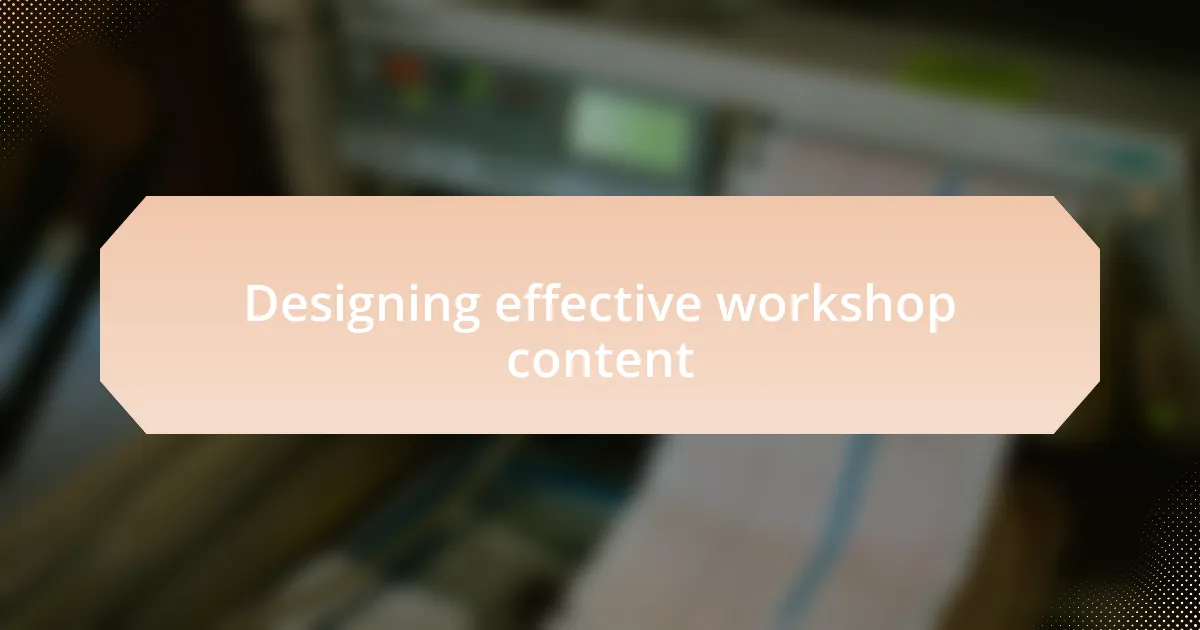
Designing effective workshop content
Designing effective workshop content begins with understanding the needs of your audience. I remember when I crafted a session focused on stress management through prayer. By incorporating elements that resonated with the participants, such as shared prayers and breathing exercises, we created an atmosphere that not only educated but also provided tangible tools for coping. Have you ever thought about how simple practices can have a profound impact on someone’s daily life?
Incorporating varied formats, such as group discussions, multimedia presentations, and reflective journaling, can greatly enhance engagement. For instance, I once utilized a video that depicted stories of triumph over adversity. The emotional response was palpable; participants were not just passive listeners—they became active contributors to the dialogue. Reflecting on how powerful visuals can complement verbal messages makes me wonder: What formats have you found to be most effective in your own experiences?
Lastly, never underestimate the power of follow-up resources. After leading a workshop on spiritual resilience, I sent out a brief guide with key takeaways and additional readings. The feedback I received was overwhelmingly positive—people appreciated having something tangible to refer back to as they continued their journey. It leads me to think: How can we create lasting impact when our sessions end?
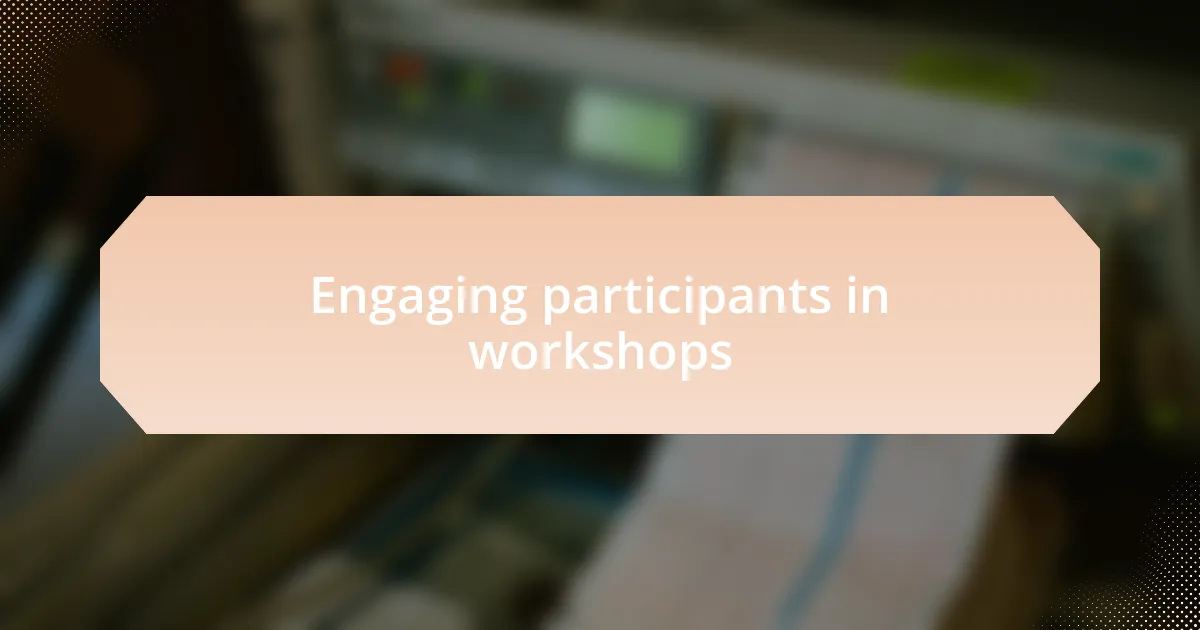
Engaging participants in workshops
Engaging participants in workshops often requires creating a space where everyone feels valued and empowered to share their thoughts. During a recent workshop on forgiveness, I noticed that inviting participants to share their personal stories created an immediate connection among them. It’s fascinating how vulnerability can foster a sense of community—have you experienced that moment when a shared story suddenly shifts the dynamic in the room?
I find that utilizing hands-on activities can significantly boost engagement levels. For example, I organized a role-playing exercise where participants acted out scenarios related to compassion in healthcare settings. The laughter and deeper discussions that followed not only broke the ice but also helped participants internalize the concepts better. Reflecting on such moments makes me ask: How often do we overlook the impact of experiential learning in our workshops?
Additionally, fostering an open-ended discussion allows participants to guide the conversation based on their interests. In one instance, after facilitating a session on hope, I prompted the group with a simple question about their definitions of hope. The replies were diverse and thought-provoking, sparking a rich dialogue that far exceeded my expectations. Isn’t it remarkable how just a few targeted questions can lead to profound insights and engage everyone involved in a meaningful way?
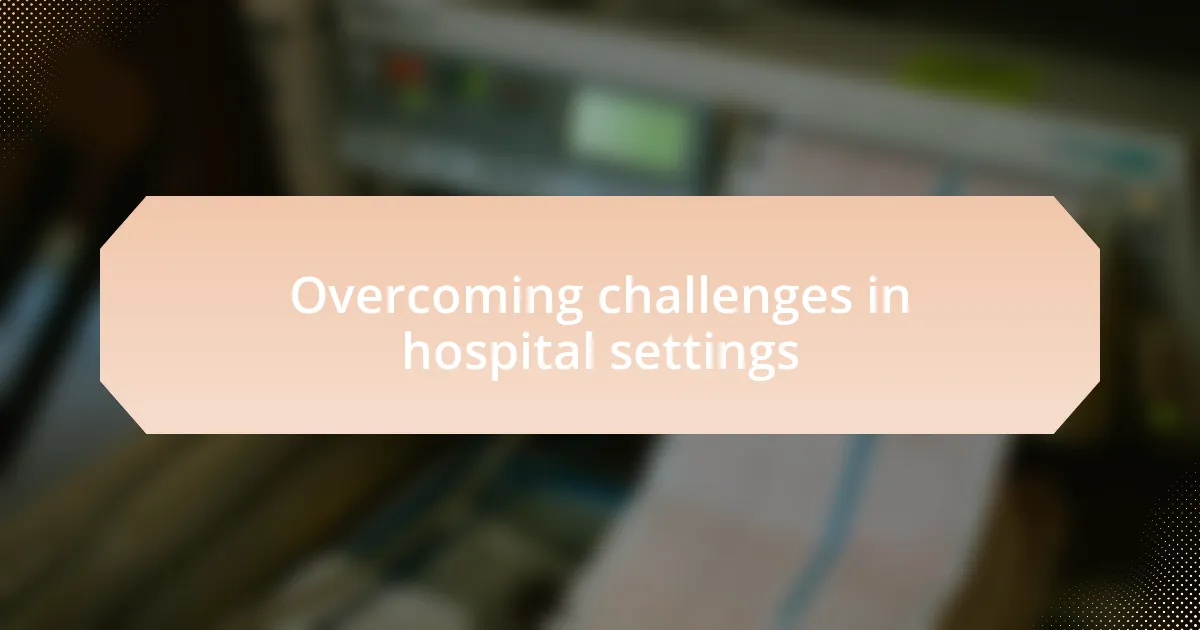
Overcoming challenges in hospital settings
Navigating the hospital environment can pose unique challenges, especially when emotions run high. I remember a particularly intense session when a participant broke down while sharing the stress of witnessing a loved one suffer. Supporting her in that moment reinforced my belief in the power of empathy and active listening, elements that are crucial in hospital ministry. How do we ensure a safe space for such vulnerable moments?
Another challenge I’ve faced is addressing the diverse spiritual needs of individuals from various backgrounds. In one workshop, I encountered participants with radically different beliefs, which could have created tension. Instead, I chose to frame our discussion around shared values, emphasizing universal themes like love and compassion. Isn’t it interesting how focusing on commonalities can break down barriers and foster understanding?
Time constraints often create additional pressure during workshops, especially in fast-paced hospital settings. There was an occasion when I had to reorganize my agenda on-the-fly, opting to dive deeper into a particular topic that resonated with the group—grief. This unexpected shift led to a more meaningful dialogue. How often do we adapt our plans to better serve the moment, trusting the process?
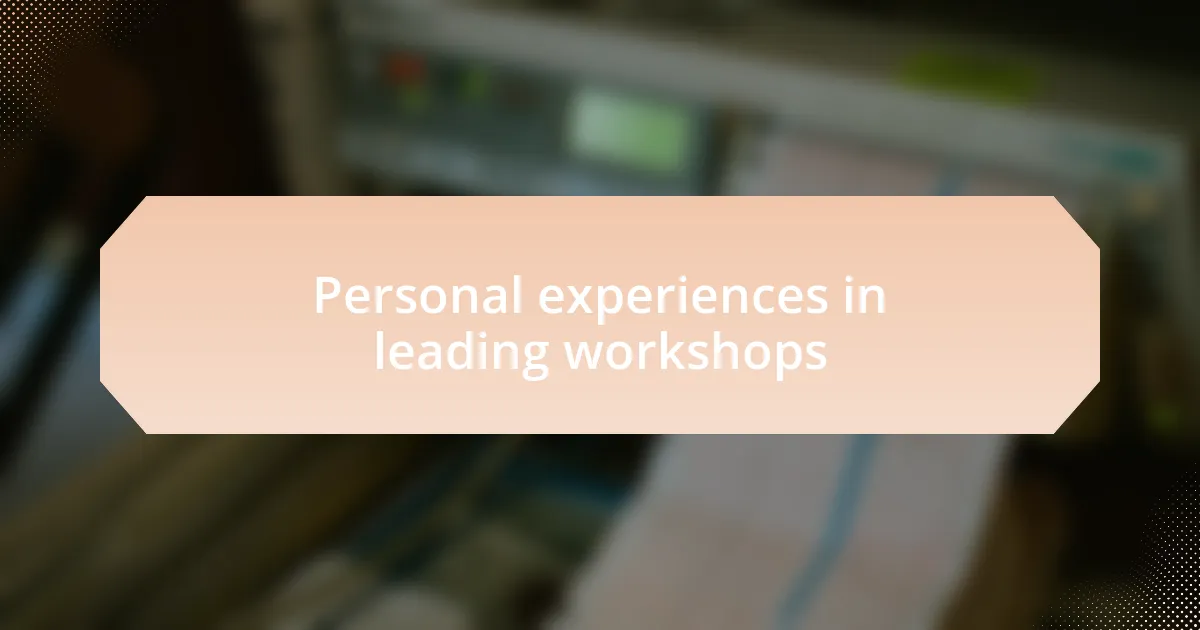
Personal experiences in leading workshops
Leading faith-based workshops in hospital settings has been a deeply transformative experience for me. I vividly recall one session where a participant shared her profound doubts about faith amidst her husband’s terminal condition. As she spoke, I felt a surge of compassion and vulnerability wash over the room, prompting me to share my own moments of doubt. It’s fascinating how sharing our struggles can create a bridge of connection; have you ever noticed how honesty can disarm even the heaviest of burdens?
In another workshop, the challenge of fostering engagement in a time-limited environment became apparent. I introduced a simple activity where participants were asked to write anonymous questions about their spiritual journeys. The room, initially filled with hesitation, transformed as we opened the envelope of collective experiences. It struck me how essential it is to create opportunities for everyone to voice their thoughts—aren’t we often surprised by the depth of insight that surfaces in these shared moments?
One memorable interaction had me working with a diverse group whose beliefs spanned a wide spectrum. Instead of allowing our differences to divide us, I encouraged an open dialogue about our unique perspectives on hope. We ended up crafting a shared manifesto on what hope looked like in our lives. It left me wondering, how often do we overlook the potential for growth that arises from embracing our differences? I walked away that day feeling uplifted, reminding me that each workshop is not just about teaching; it’s about discovering the richness of our collective faith journeys.
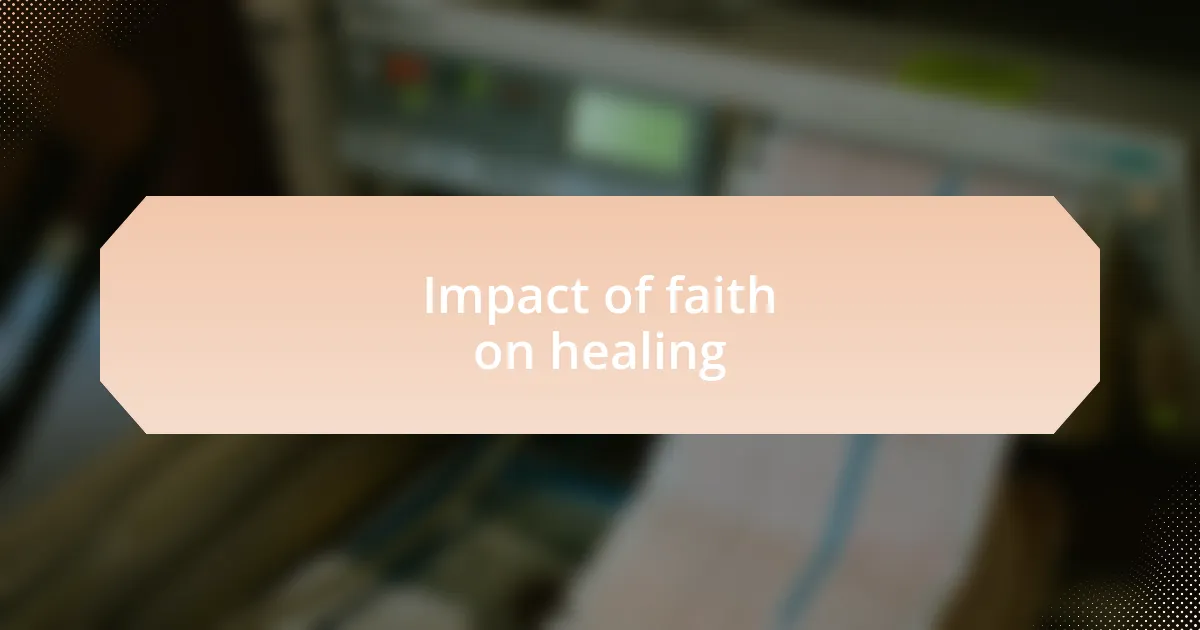
Impact of faith on healing
Faith has a profound impact on healing, both emotionally and spiritually. I recall one participant in a workshop who found solace in prayer during her battle with cancer. She spoke about how faith became her anchor, providing her not just strength to face each day but also a sense of peace that significantly eased her anxiety. It made me wonder, can the act of surrendering to a higher power truly transform our perception of suffering?
In my experience, faith can also foster resilience in challenging times. I once facilitated a group session where individuals shared stories of healing that seemed miraculous. One man recounted a moment of despair followed by an unexpected recovery that he wholeheartedly attributed to his faith community’s prayers. Listening to his story reminded me of the old adage: faith is taking the first step even when you don’t see the whole staircase. How many times have we been surprised by what we can endure when buoyed by belief?
Additionally, the collective faith of a community often amplifies individual healing journeys. I remember a group gathered in a hospital chapel, united in prayer for a fellow member’s recovery. The palpable energy in the room was almost tangible, invigorating everyone present. This experience left me contemplating the profound question: if community support can strengthen our faith, what barriers might we overcome together in our healing?